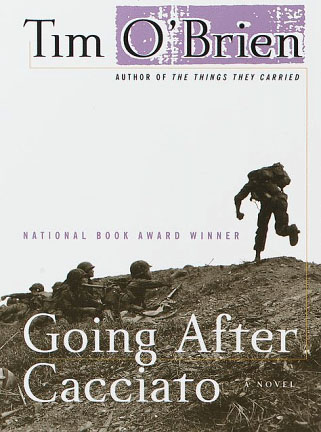| "The common grunt doesn't give a
damn about purposes and justice. He doesn't even think about that shit. Not when he's out
humping, getting his tail shot off. Purposes - bullshit! He's thinking about how to keep
breathing. Or he wonders what it'll feel like when he hits that booby trap. Will he go
nuts? Will he puke all over himself, or will he cry, or pass out, or scream? What'll it
look like - all bone and meat and pus? That's the stuff he thinks about, not
purposes." (p. 178). |
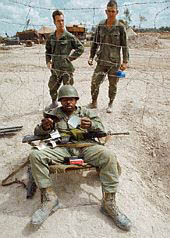
|
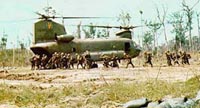
|
"Does not purpose reflect on
self-respect? Does not the absence of good purpose jeopardize the soldier's own ego, thus
making him less likely to fight well and bravely? If a war is without justice, the soldier
knows that the sacrifice of life, his own valued life, is demeaned, and therefor his
self-respect must likewise be demeaned." (p. 179). |
| "In war one nation is able to make
up for production insufficiencies by calling on the industrial capacity of allied nations...By
citing a great moral purpose, Britain was able to generate American industrial aid to
defeat the Germans. In comparison, Germany and Japan were left virtually without allies.
Unable to summon other nations to their cause, because, in fact, they had no just cause.
So in the end it was an absence of clear moral purpose that produced defeat." (p.
177). |
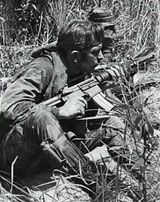
|
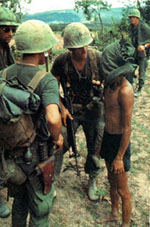
|
"Not because of strong convictions,
but because he didn't known. He didn't know who was right, or what was right, he didn't
know if it was a war of self-determination or self-destruction, outright aggression or
national liberation; he didn't know if nations would topple like dominoes or stand
separate like trees; he didn't know who really started the war, or why, or when, or with
what motives; he didn't know if it mattered; he saw sense in both sides of the debate, but
he did not know where the truth lay; he simply didn't know. He just didn't know if the war
was right or wrong or somewhere in the murky middle. So he went to war for reasons beyond
knowledge. Because he believed in law, and law told him to go. Because it was a democracy...He
went to war because it was expected. Because not to go was to risk censure, and to bring
embarrassment on his father and his town. Because, not knowing, he saw no reason to
distrust those with more experience. Because he loved his country, and more than that,
because he trusted it. Yes, he did. Oh, he would rather have fought with his father in
France, knowing certain things certainly, but he couldn't choose his war, nobody
could." (p. 234-235). |
